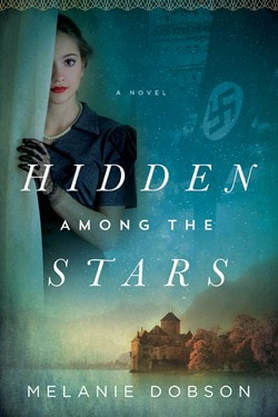 I received a complementary copy of Hidden Among the Stars in exchange for an honest review of its merits. To begin with, it is best to establish that I am not one who fancies a romance novel when I am picking up a book to read. I don't mind romantic elements, and tend to include them in my own novels, but for me character motivation is most important. That being said, I enjoyed the characters and their drives for the most part in this book. The time-slip nature of this tale involved two storylines, one in the present and one 80 years earlier during the opening days of World War II. As a former World History teacher, I appreciated the author's strong research into into pre-war Europe, as this helps the reader connect to the era. The development of the love triangle between Luzia, Annika and Max is well-crafted throughout the story, leading up to climatic reveal at the end. The idea of missing Jewish treasures is a fascinating sub-plot to the storyline. The love story in the present between Callie and Josh flows along at a natural, if halting, pace. There are significant barriers between the two and it is clear why her past rejection is crippling forward momentum in this area. I was intrigued by the brash actions of one of the clearly undesirable suitors. I was shocked by his behavior, but, sadly, did not find it unbelievable, just a highly disappointing example of my gender. One of the most endearing aspects of this work is where Callie, the Story Lady, is often quoting famous lines from children books when she faces challenges in life. If she were spouting Bible verses, the story would seem too preachy, but the fact that she finds wisdom in the stories she shares with kids at her store every week gives the character an air of authenticity that rings true. On the whole, Melanie Dobson weaves together two disparate time periods to deliver a well-told tale. SPOILER ALERT - If you wish to remain in the dark about my thoughts on the ending, please stop reading here. OK, since you are still with me, here we go… The only aspect of the book that doesn't ring true is the climax. I get the noble nature of the sacrifice Annika makes so Luzia and her unborn child are not taken away, but, in my estimation, this makes her a weaker character, not a stronger one. She already has to give up on Max because he loves Luzia (we will look past her son's true parentage, which I thought was well, if painfully, told), but does she also have to give up on a relationship with Hermann just so she can play the "best friend ever" role. I would contend that she does act with honor but, in reality, passively sublimates her needs for someone who will never really understand her true feelings for him. There may a religious covering over the entire affair, but it seems a poor excuse for her actions. Then again, all that is subjugated upon the assumption that authors direct the actions of characters, rather than characters doing what comes natural to them. In the end, the Dobson asks if I agree with Annika's actions. I, for one, do not, but maybe I am not supposed to. Just like Luzia is not supposed to end up with her first love either, which is the second of many tragedies in this story. The fact that I don't agree with the actions of a character may be exactly why Dobson allowed her character to do what she did In addition, the ending seemed overly sentimental but I tend to be much more forgiving of such endings on screen than in print, so that might be a wholly unfair criticism to make as well. By the way, don't forget to enter the Amazon gift card giveaway!
2 Comments
|
AuthorI've been writing stories and taking photos since I was old enough to hold a pencil and stand behind a tripod. Archives
February 2024
Categories
All
|
 RSS Feed
RSS Feed